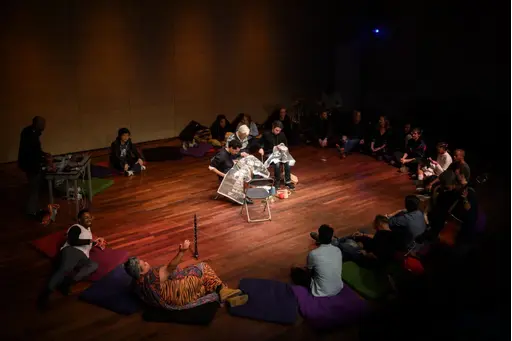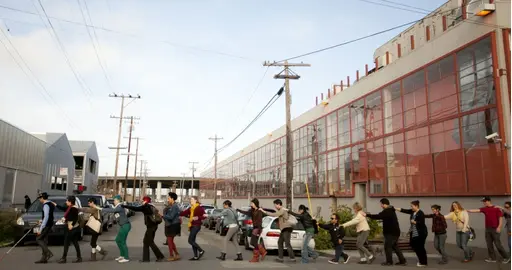
until 8 November 2019
Training XIII
(New) Formats of Care in Times of Violence
The thirteenth training as part of the Trainings for the Not-Yet is with Patricia Kaersenhout, and takes place 6-8 November 2019 (Wednesday-Friday).
This training focuses on storytelling, dialogue, embroidery, and spiritual healing.
Note: only (those who identify as) men can participate in this training.
How does one care in times of violence? The practice of artist, activist, and womanist Patricia Kaersenhout can be seen as an ongoing search to respond to this conundrum, oscillating tirelessly between the space of art and that of everyday life. In this context, the starting point of the training (New) Formats of Care in Times of Violence is Kaersenhout’s long-standing fascination with the triptych Scenes from The Story of Nastagio degli Onesti (1483) by the early Renaissance Italian painter Sandro Botticelli, based on a story in The Decameron by Giovanni Boccaccio. Here, Botticelli portrays raw scenes of fanatical violence and murder driven by unrequited love. The acts depicted, although intolerable, also attest paradoxically to the deep power of love, and in turn spark a new affectionate relationship. In the communal training convened by Kaersenhout, she deliberates on issues of violence, manipulation, and subjugation that the work encompasses as they relate to the present. She involves participants in a deep reading of Botticelli’s work from a twenty-first-century feminist perspective, while engaging in storytelling, dialogue, collaborative embroidery, and spiritual healing as a training for collective resistance and a commitment to living otherwise.
This training is specifically open to men to attend. This is a conscious choice by Kaersenhout, as the topic of violence against women is usually highlighted from a women’s perspective. With this training, Kaersenhout and participants will rethink the role of men in relationships, as well as concepts such as masculinity and men’s emancipation. All men interested in these topics are very much invited to sign up to this training!
When: 6-8 November (Wednesday-Friday)
Daily, 14-18 hrs, followed on weekdays by dinner from 18–19 hrs in the Basic Activist Kitchen.
On Friday 8 November participants will be part of the public program taking place at the same time.
Participation:
This is a three-day training. It is possible to join on individual days, although attending the training in its entirety is encouraged.
Language: English
Note: only (those who identify as) men can participate in this training.
How does one care in times of violence? The practice of artist, activist, and womanist Patricia Kaersenhout can be seen as an ongoing search to respond to this conundrum, oscillating tirelessly between the space of art and that of everyday life. In this context, the starting point of the training (New) Formats of Care in Times of Violence is Kaersenhout’s long-standing fascination with the triptych Scenes from The Story of Nastagio degli Onesti (1483) by the early Renaissance Italian painter Sandro Botticelli, based on a story in The Decameron by Giovanni Boccaccio. Here, Botticelli portrays raw scenes of fanatical violence and murder driven by unrequited love. The acts depicted, although intolerable, also attest paradoxically to the deep power of love, and in turn spark a new affectionate relationship. In the communal training convened by Kaersenhout, she deliberates on issues of violence, manipulation, and subjugation that the work encompasses as they relate to the present. She involves participants in a deep reading of Botticelli’s work from a twenty-first-century feminist perspective, while engaging in storytelling, dialogue, collaborative embroidery, and spiritual healing as a training for collective resistance and a commitment to living otherwise.
This training is specifically open to men to attend. This is a conscious choice by Kaersenhout, as the topic of violence against women is usually highlighted from a women’s perspective. With this training, Kaersenhout and participants will rethink the role of men in relationships, as well as concepts such as masculinity and men’s emancipation. All men interested in these topics are very much invited to sign up to this training!
When: 6-8 November (Wednesday-Friday)
Daily, 14-18 hrs, followed on weekdays by dinner from 18–19 hrs in the Basic Activist Kitchen.
On Friday 8 November participants will be part of the public program taking place at the same time.
Participation:
This is a three-day training. It is possible to join on individual days, although attending the training in its entirety is encouraged.
Language: English
Long-Term ProjectPropositions for Non-Fascist Living
with: Patricia Kaersenhout
Trainings for the Not-YetTraining XXIITraining XXTraining XXITraining XVIIITraining XVI Training XVII Training XVPropositions #9/4 Training Propositions #9/3 Training Propositions #9/2 TrainingPropositions #9/1 Training Training XIIITraining XIITraining XIStranded FMTraining XTraining VIII Training IXTraining VII Training VI Training IV Training V Training IIIThe Basic Activist KitchenTraining II Training Program Training I Opening Trainings BAK, basis voor…